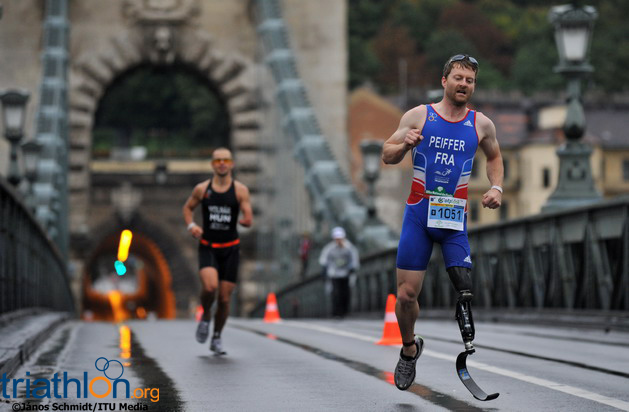The 2011 Dextro Energy Triathlon ITU World Championship Series hits its peak in exactly one month, when the world’s best converge in China for the Beijing Grand Final. Who will be the 2011 World Champions? Will Barbara Riveros Diaz get the jump on Paula Findlay? Will Alistair Brownlee be able to make up points on Javier Gomez? But don’t forget that Beijing isn’t all about the elite competition. Here we look at the five top things to expect when the world’s biggest and best triathlon event rolls into the city that helped create Olympic triathlon history in 2008, Beijing.
It’s a triathlon-fest!
The action isn’t just around the Dextro Energy Triathlon ITU World Championship Grand Final, it is simply the biggest week of the triathlon year. It all starts on Monday with an ITU Paratriathlon classification course, before the events starting kicking off on Tuesday - starting with the 2011 ITU Aquathlon World Championships. That kicks off the list of world titles that will be decided that week, age-group sprint and Olympic distance, junior men and women, Under23 men and women, Paratriathlon and the elite men and women in the series Grand Final. Throw in the ITU’s Executive Board meeting and ITU Congress and you have not only the best athletes in the world in one place, but all of triathlon’s powerbrokers.
Who will top the Age-Group world championship tally?
Thousands of age-group athletes will take centre stage as they battle to be the best in the world of September 10 and 11. But overall, who will be the most successful nation? In Budapest there were 2889 age-group athletes and 204 medals given out. Great Britain took home a total of 56 age-group medals, ahead of the USA who finished with 48. Australia and Canada both claimed six gold medals, but totals of 15 and 19 medals respectively. Great Britain did have the biggest team in Budapest though, with 596 athletes. Hungary had 451, USA had 351, Australia 201 and Canada 175. But what about a round of applause from those athletes who were the only representative from their country in 2010? Argentina, Bulgaria, Colombia, Costa Rica, Guatemala, Iceland, Morocco, Namibia, The former Yugoslav republic of Macedonia, Panama, Romania, Saint Kitts and Nevis, Tunisia, Uruguay and Venezuela. For the final age-group courses maps and videos, please click here.

A new era for Paratriathlon
This year will be the first ITU Paratriathlon World Championships since the announcement by the International Paralympic Committee last December, that the sport has officially been included in the programme for the Rio 2016 Paralympic Games. Therefore it’s fitting that this year’s will be the biggest event in Paratriathlon history, thanks to the 27 nations who signed a committment in response to the original Paralympic bid. Those 27 nations each committed to send athletes to Beijing, as well as host national paratriathlon championships in their regions from this year and beyond. In Budapest, there was a total of 88 athletes from 17 countries, which was double the amount that entered in 2008. With 27 counties entered, this year is set to be huge. The list of the 27 countries that have pledged to send paratriathletes to participate in the 2011 ITU Paratriathlon World Championships and to host National Championships in 2011 are: Argentina, Australia, Austria, Brazil, Canada, China, France, Germany, Great Britain, Hungary, Israel, Italy, Japan, Korea, Mexico, Morocco, Netherlands, New Zealand, Philippines, Portugal, Russia, Singapore, South Africa, Spain, Sweden, Switzerland, and United States.
Olympic qualification on the line
The Dextro Energy Triathlon ITU World Championship London had plenty more than just series points riding on it. For most major National Federations it was also an Olympic selection event. Athletes like Helen Jenkins (GBR), Andrea Hewitt (NZL), Anja Dittmer (GER), Sarah Groff (USA), Gwen Jorgensen (USA), Alistair Brownlee (GBR), Steffen Justus (GER), Jan Frodeno (GER), Laurent Vidal (FRA) and David Hauss (FRA) all qualified to represent their national federations at the London 2012 Olympic Games. But plenty more federations have made Beijing - both the individual race or overall standings important criteria - so watch out for athletes like Paula Findlay (CAN) and men from New Zealand, like Bevan Docherty (NZL) and Kris Gemmell. No Kiwi male met the qualifying criteria in London but Triathlon New Zealand states in its criteria that if that did happen, Beijing was likely to be used as the next qualifying event.

Who will be crowned ITU World Champion?
There is still the sprint distance Lausanne round to come, the current rankings leaderboard shows that the battle for the 2011 ITU world title, in both men’s and women’s, is going to be thrilling. The top three women in series rankings are currently separated by just eight points. Barbara Riveros Diaz has 2948 points, just five points ahead of Andrea Hewitt who has 2493. Just three points behind Hewitt is Paula Findlay, who stormed to the top of the rankings with three consecutive wins to start the season – but has since been hampered by a hip injury. Findlay still has 2490 points. Helen Jenkins is in fourth with 2346, while two-time reigning world champion Emma Moffatt and Sarah Groff are the other two sitting over 2000 points after London, 2061 and 2001 respectively.
Among the men, Javier Gomez leads Alistair Brownlee, 2660 points to 2490, while Alexander Brukhankov continues on his great year in third with 2403 points. Sven Riederer, Jonathan Brownlee, David Hauss and William Clarke are all within striking distance though. Remember that in the Grand Final, there are 1200 points on offer for the winner instead of the usual 800 for the other series races - and therefore everything can change on the day. Dextro Energy Triathlon ITU World Championship Series events and ITU Triathlon World Cup rankings are counted in the final world championship rankings, for a full explanation of points please click here


